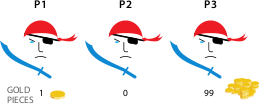A pirate captain was brutally murdered today after taken ill advice from a paper on game theory.
From our nautical reporter
The Ocean — The fierce pirate One-Eyed Beardless was found dead in his cabin early this morning. The police quickly deduced from the multiple stab wounds the pirate’s death was a brutal murder, but were puzzled by the fact a single golden coin was placed on his red bandanna. The forty-five year old pirate, who was the captain of the three pirate schooner The Black Compass of Hades, appears to have been stabbed with his own blue scimitar. The other two pirates on board are held for questioning by the nautical police.
Police sources disclosed to this paper, the motive for the murder seems to be a row over the division of a loot. Until recently, the loot was divided more or less equally, but after reading the paper ‘A Puzzle for Pirates‘ a new system was introduced. The paper argues that, given a pecking order of pirates and a democratic majority voting system, the fiercest pirate (P3) can divide a 100 gold pieces loot by giving 1 piece to the least fierce pirate (P2), nothing to pirate in between (P2) and by keeping the remaining 99 pieces to himself. Given all pirates are rational, this division system would win the support of the majority, the fiercest (P3) and the least fierce pirate (P2).
We asked Prof. Moriarty, professor of pirate behaviour with the University of Leyden, why the system failed. ‘The problem’, the professor said, ‘is that the paper’s definition of rationality is what the German philosopher Nietzsche called a ‘grocer’s mentality’. It assumes to be rational is to accept one gold piece over nothing, because one is better than nothing. However, by accepting one gold piece, the least fierce pirates also accepts the new system, such that it will become the system for future loot divisions. By accepting the new system, the lesser fierce pirates accept the total dominance of the fiercest. However, the three pirates presumably invest roughly equal efforts in acquiring a loot. The new system is therefore a big loss for the lesser fierce pirates (P1, P2) and a big win for the fiercest (P3). Concluding, it is not rational for the lesser pirates to accept either one gold piece or no pieces, where rational means to calculate the optimal return on investment. ‘
‘The lesser pirates’, the professor continued, ‘are better off going on strike. The investment in looting within this scheme is not profitable for them, the fierce pirate will have to do it on his own – which will probably fail or yield a smaller loot. This rational calculation of the lesser pirates will show itself as pride: they will refuse to accept this ‘charity’. The fierce pirate, being the fiercest, can respond by bullying and threatening them into accepting it, as I presume happened in this particular case, but this will have the dire consequences we have witnessed today.’ Before returning back to his desk to meet his article quota, the professor advised ‘it is better to react on instinct – such as pride – in these cases, than to make conscious decisions based on game theory papers. The body is much more intelligent than consciousness.’A pirate captain was brutally murdered today after taken ill advice from a paper on game theory.
